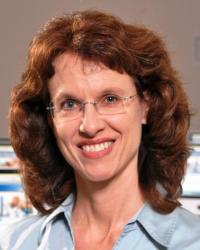Virtual schooling: Rethinking classroom boundaries
When Cathy Cavanaugh envisions the future of virtual education, she doesn’t see a child sitting alone in front of a computer. Instead of an alternative to traditional K-12 education, she pictures virtual schooling combining with face-to-face instruction to create a global learning network as unique as the individual student.
“Virtual education breaks down physical and time barriers to put together an experience that works for each student,” she said.
 Cavanaugh, an associate professor of educational technology in the College of Education’s School of Teaching and Learning, says online coursework is a promising way to extend K-12 instructional time. By removing the limitations of time and geography, students who need remedial help – as well as those who blaze through the curriculum ahead of the pack – can get the extra instruction they need.
Cavanaugh, an associate professor of educational technology in the College of Education’s School of Teaching and Learning, says online coursework is a promising way to extend K-12 instructional time. By removing the limitations of time and geography, students who need remedial help – as well as those who blaze through the curriculum ahead of the pack – can get the extra instruction they need.
The online component could happen in the classroom, at home with an online teacher, or in a computer lab supervised by a tutor.
“There’s so much flexibility,” Cavanaugh says. “With virtual education, students can take the time needed to master the standard. They don’t have to stop when the bell rings.”
Growing up in upstate New York, Cavanaugh attended a small school that served farm families from a 40-mile radius. With few ways to learn about the outside world, her own early education could have benefitted from the wide-open horizons of online learning.
“It was quite a distance to the next city,” she said. “I really would have seen the value in communicating with people in other places.”
Cavanaugh attended UF as an undergraduate, becoming a middle-school science teacher in 1982. While pursuing her master’s degree at the University of Central Florida in the late ‘80s, she realized how much she enjoyed research, and went on to get a doctorate at the University of South Florida in 1998. After a seven-year stint teaching at the University of North Florida, she came to UF in 2007.
Since arriving at UF, Cavanaugh has cemented her status as a global leader in the virtual-education field, earning a 2009 award for research from the International Council for K-12 Online Learning. Add the nationwide attention garnered by her 2009 paper for the Center for American Progress, and Cavanaugh finds herself in demand around the country as a speaker and adviser.
When she’s at UF in Gainesville, a typical day involves counseling her doctoral and master’s students, collaborating with colleagues both on campus and around the country and advising education foundations that want to know more about the potential of virtual schooling.
She also oversees UF students interning with the Orlando-based Florida Virtual School, and, as part of the Florida Department of Education’s Leveraging Laptops team, analyzes data on how technology is used in the classroom. Along with associate professor Kara Dawson, Cavanaugh follows classrooms in 29 school districts to observe how enhanced technology and professional development can revolutionize the learning environment.
In the program’s fourth year, “we’re seeing significant changes in classrooms,” she said. “It’s resulting in more meaningful and authentic learning.”
Cavanaugh also chairs UF’s Technology Innovations Advisory Committee, made up of 12 members from across campus tasked with identifying emerging technologies that could further the university’s mission.
“We want to increase awareness of the kinds of technology available to faculty,” she said. “It’s about getting faculty to think differently about time and place in their classes.”
Like college faculty, Cavanaugh hopes K-12 educators – a group that sometimes sees online education as competition – will embrace virtual learning, especially since she predicts that all K-12 students will be doing some online coursework within a decade.
“It might just be a module, not a whole course, but it’s all about individualizing the experience, making a deeper educational experience for the student. It’s an opportunity for students to learn a standard in a way that’s meaningful and engaging to them.”
# # #
CONTACTS
SOURCE: Cathy Cavanaugh, associate professor, education technology; 352-273-4176
WRITER: Alisson Clark (special to UFCOE)
MEDIA CONTACT: Larry Lansford, UFCOE News & Communications; 352-273-4137




